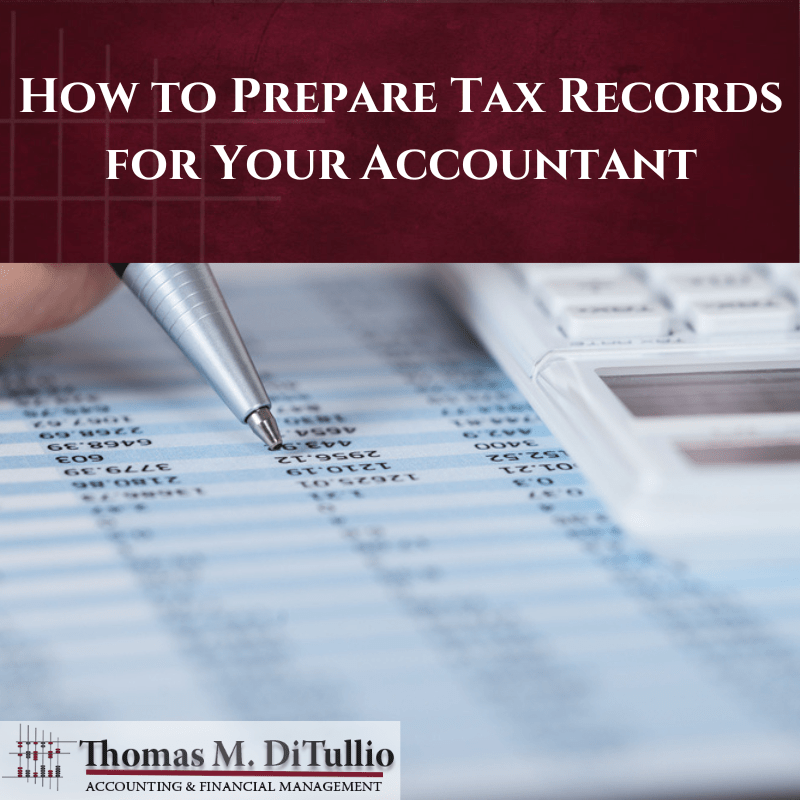How to Prepare Tax Records for Your Accountant
When it comes time to prepare your income tax returns, you need help from an accountant. Most business owners don’t have the time to file taxes or want to make a costly mistake. An accountant can sort through all those records, but they need a little help from you. You must bring the proper documents and forms to help your accountant during tax time. Here are some ways to prepare your tax records for your accountant.
What To Bring
Before you head over to your accountant, you need a few essential documents. First, you must bring identification information. These documents will prove your identity. You should bring your Social Security card and a photo ID. Along with that, take a copy of your most recent tax return.
In some cases, you might not qualify for the same write-offs or deductions as the previous year. However, these documents can help your accountant access certain information and calculate deductions. If you are working with a new accountant, your past tax return will allow them to discover any discrepancies between those previous tax returns.
Don’t forget about those wage statements. If you are an employee at a company, you should bring your employer’s W-2 wage and tax statement. Freelancers and independent contractors are considered non-employees. While they don’t receive the traditional W-2s, these workers often get a 1099-MISC from each client. You should send these forms to your accountant.
All dividend income from investment, unemployment, and Social Security income will need to be reported. You should have received a statement for those sources of revenue. Bring those documents to help your accountant.
Any real estate documents are essential. When it comes to real estate, there are many deductions. You should deliver all documents related to proof of paid mortgage, home equity loan interest, a recent home purchase, or paid personal property taxes to your accountant.
You want to get all those credits and deductions during tax time. Always have your proof of expenses. These documents include IRA contributions, invoices, medical bills, charitable contributions, self-employment expenses, mileage logs, and job hunting expenses. You would rather bring too much documentation to your accountant rather than miss critical pieces of information for tax time.
Common Business Records
There are plenty of tax documents you will want to bring for your accountant. First, you need all those financial statements for your business. These documents include balance sheets, cash flow records, and profit-loss reports. If you have employees, payroll information is another vital document for your accountant.
If you have any business expenses, take those records and hand them to your accountant. These expenses can include rent, utility, office supplies, telecommunication, internet, advertising, and travel costs. For those businesses that have vehicles, you will need to record all of the motor vehicle expenses, including driving logs and operating costs. You will need to keep track of asset additions and disposals involving machinery, buildings, and land.
Make the Process Easier for Your Accountant
When you use small business accounting services, you will want to make their job easier. In most cases, you pay the accountant by the hour. If they have to search for information, it could lead to frustration for all parties. Plus, it adds to your expenses. Here are a few ways you can help your accountant.
Speed Up the Process
With all of that information, documentation, and receipts on hand, your accountant will have an easier time with your tax returns. Remember that accountants are busy and work on several tax files during tax time. When you have all of your information, it can help them efficiently prepare and file your taxes.
Stay Organized
Whether you are a sole proprietor or operate a large company, you always need to stay organized. You should keep all receipts together. With the proper organization, your accountant does not have to spend time shifting through boxes of receipts. Those unsorted documents will increase your accountant’s time spent on your taxes.
Summarize Your Expenses
Consider providing your accountant with a summary of your records. All of your checks, business expenses, and invoices should be totaled and categorized. When everything is indexed, it will make your accountant’s job much easier for tax season.
Keep Personal and Business Expenses Separate
If you have several businesses, always separate each company’s revenue and expense documents. In addition to that, you never want to mix both your personal and business expenses together. Once again, if you do that, it will take time for your accountant to separate those expenses for your tax returns.
Don’t Wait Until Tax Time
When you work with an accountant, they can provide advice throughout the year. You do not have to wait to ask questions for the tax season. These professionals will be able to provide answers to your business questions. Plus, they can maximize your credit and deductions. In addition to that, they can analyze your financial health to plan for the future.
Come Prepared
Every year, filing tax returns can be complicated. Accountants know how to handle these tasks, but you can make their jobs easier by preparing the proper documentation. You can take the stress out of the season by staying organized when working with an accountant.
Final Thoughts
When you need an accountant for my small business, reach out to TMD Accounting. We have helped small and large companies for the past 40 years in Gloucester County. Our family-owned and -operated business can assist with your payroll, taxes, and bookkeeping services. Schedule your consultation by calling 1-856-228-2205.

